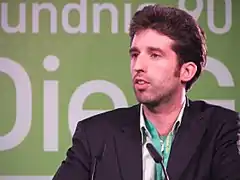Boris Palmer
Boris Erasmus Palmer (born 28 May 1972) is a German politician and member of the Green Party. He has been mayor of Tübingen since January 2007. From March 2001 to May 2007, he was a member of the Baden-Württemberg Landtag, the State parliament in Stuttgart.

Background
Palmer was born in Waiblingen, Baden-Württemberg. His father, Helmut, dubbed Remstalrebell ("Rems-valley rebel") was a very well known and controversial figure and perennial candidate.[1] In a Deutsche Welle interview for the program Talking Germany with Peter Craven, Palmer described his father as a rebel who became a political activist in the 1950s, when "all the old fascists, all the old Nazis were back" in power, and said that his grandfather was a Jew who had to flee to the United States in 1938.[2] The former state minister and CDU member Christoph Palmer is a second nephew of Helmut and a second cousin of Boris Palmer.[1]
Palmer graduated from high school (Abitur) at the Steiner School in Winterbach-Engelberg in 1992. From 1993, Palmer studied history and mathematics at the University of Tübingen and in Sydney. In 1996, he joined the Green Party.
Career
After graduating from Tübingen in 1999 Palmer worked as a scientific assistant for the Green Party in the Bundestag, the German Federal parliament, in Berlin.
In March 2001 he won a seat in the Landtag of Baden-Württemberg and was appointed party spokesman for environmental and transportation issues.
In 2004 he ran for the office of mayor of Stuttgart, finishing in third place in the first round ballot at 21.5% of votes,[3] a better result than all previous Green candidates for mayor of Stuttgart. He withdrew his candidacy before the second round ballot with an indirect recommendation that his followers should vote for the incumbent mayor Wolfgang Schuster on condition that Schuster would hold a referendum on the controversial project Stuttgart 21, which Palmer is opposed to, if costs would increase significantly. Even though that has been the case, Schuster hasn't kept that promise.
After being re-elected to the Landtag in March 2006, Palmer decided in July to run as mayor of Tübingen and won the election on 22 October with 50.4% of the vote. He subsequently resigned from his Landtag mandate after taking office in January 2007.

In July 2009, Palmer was criticized for recommending antizionist activist and Tübingen resident Felicia Langer for the Federal Cross of Merit.[4]
Palmer was a Green Party delegate to the Federal Convention for the purpose of electing the president of Germany in 2010. In March 2011, the Greens won the Baden-Württemberg state election: after decades, the CDU lost its power. Since then, Minister-President of Baden-Württemberg is a Greens politician, Winfried Kretschmann.
In November 2012, after Palmer had been critical of child adoption by homosexual couples and criticism about him being not much of a team player, the central Green party council did not reelect him.[5] On 19 October 2014 Palmer was reelected for another eight-year term.[6] Palmer's relatively conservative stance within the Greens is well known and he has been deemed as controversial in the party. His use of Facebook, e.g. with regard to a landlord that wasn't willing to serve drinks on inn's terrace, has caused some conflicts and doubts about his diplomatic skills.[7]
In late 2015, Palmer was heavily criticized by other members of the Green Party as well the party's youth organization, the Green Youth for his relatively right-wing (compared to the rest of the party) positions on immigration in combination with the refugee crisis. In August 2017, some weeks before the German federal election, Palmer published the book German: Wir können nicht allen helfen.
On May 5, 2020, The New York Times reported that "Boris Palmer, the mayor of Tübingen, in the country’s southwest, suggested that reviving the economy mattered more than the lives of potential coronavirus victims, whom he characterized as old and unwell. “Let me be blunt: In Germany, we might be saving people who would be dead in half a year anyway,” he said in a TV interview last Tuesday."[8]
Other activities
- Max Planck Institute for Biological Cybernetics, Member of the Board of Trustees
- Max Planck Institute for Intelligent Systems, Member of the Board of Trustees
References
- Michael Ohnewald: Helmut Palmer. Lebensweg eines Rebellen (Biography of a Rebel). Hohenheim-Verlag, Stuttgart 2004, ISBN 3-89850-114-0
- Interview with Peter Craven (18 February 2014). "Boris Palmer, Mayor of Tübingen". Deutsche Welle. Retrieved 29 March 2016.
- OB-Wahl in Stuttgart: CDU-Amtsinhaber vorn, aber ohne absolute Mehrheit [Mayoral elections in Stuttgart: CDU incumbent front-runner but without an absolute majority] (German language) Spiegel online 10 October 2004, accessed 1 August 2009
- "Langer-Ehrung: Attacken gegen Palmer" [Langer decoration: Attacks against Palmer]. Schwäbisches Tagblatt (in German). Tübingen. 23 July 2009. Archived from the original on 24 September 2015. Retrieved 20 October 2014.
- Baden-Württemberg Palmer bleibt Oberbürgermeister in Tübingen
- "Boris Palmer mit 61,7 Prozent als Oberbürgermeister wiedergewählt" [Boris Palmer reelected mayor with 61,7%]. Schwäbisches Tagblatt (in German). Tübingen. 20 October 2014. Retrieved 20 October 2014.
- Stadelmaier, Gerhard. "Boris Palmer : Nix nei – naus!". FAZ.NET (in German). ISSN 0174-4909. Retrieved 2 November 2020.
- "National governments set policies. That doesn't mean local governments follow them". The New York Times. 21 May 2020. ISSN 0362-4331. Retrieved 2 November 2020.
| Wikimedia Commons has media related to Boris Palmer. |